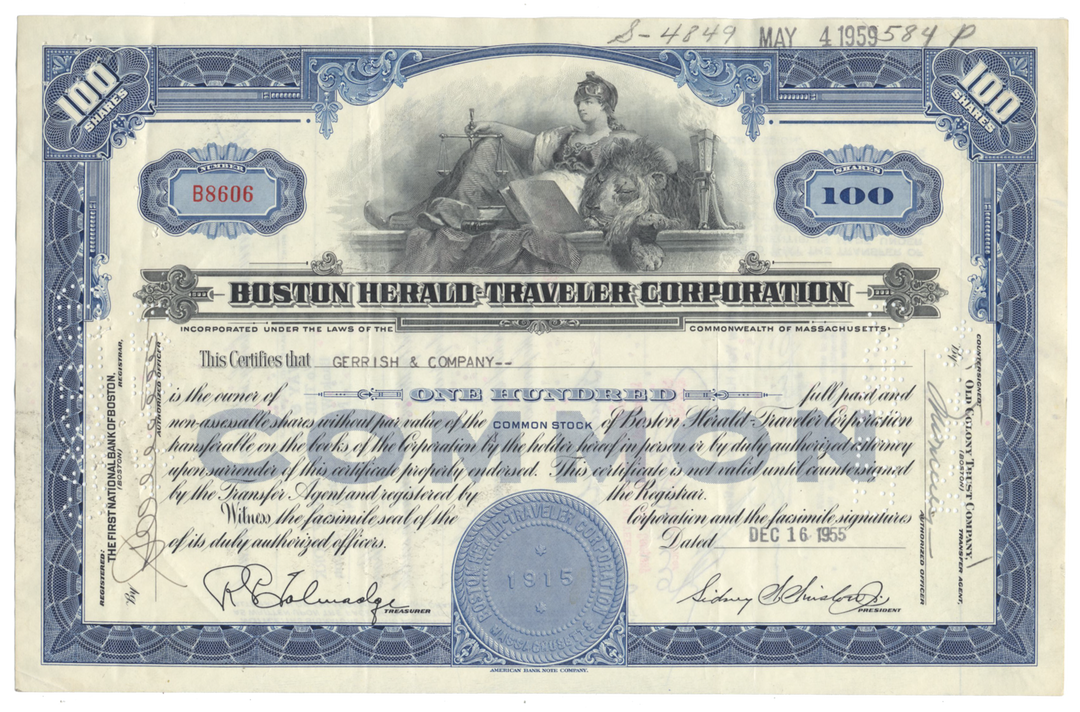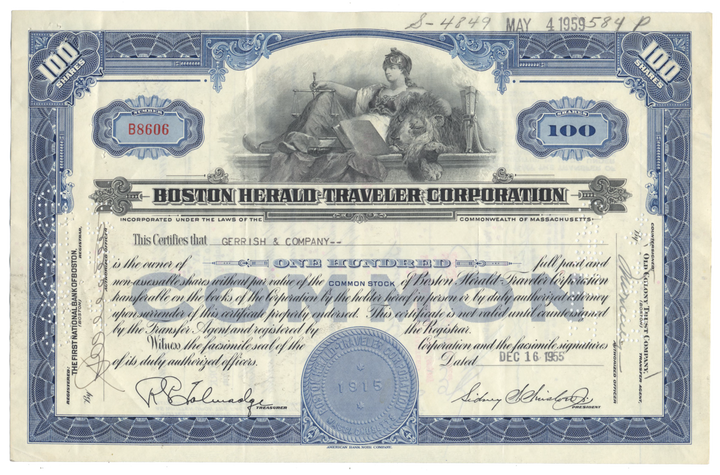Boston Herald-Traveler Corporation
- Only 1 available!!
- Backordered, shipping soon
- Guaranteed authentic document
- Orders over $35 ship FREE to U. S. addresses
Product Details
CompanyBoston Herald-Traveler Corporation
Certificate Type
Common Stock
Date Issued
December 16, 1955 (blue)
January 22, 1959 (brown)
Canceled
Yes
Printer
American Bank Note Company
Signatures
Machine printed
Approximate Size
11" (w) by 7" (h)
Images
Show the exact certificate you will receive
Guaranteed Authentic
Yes
Additional Details
NA
Historical Context
The Daily Advertiser was established in 1813 in Boston by Nathan Hale. The paper grew to prominence through the 19th century, taking over other Boston area papers. In 1904, William Randolph Hearst began publishing his own newspaper in Boston called The American. Hearst ultimately ended up purchasing the Daily Advertiser in 1917. By 1938, the Daily Advertiser had changed to the Daily Record, and The American had become the Sunday Advertiser. A third paper owned by Hearst, called the Afternoon Record, which had been renamed the Evening American, merged in 1961 with the Daily Record to form the Record American. The Sunday Advertiser and Record American would ultimately be merged in 1972 into a line of newspapers that stretched back to the old Boston Herald.
The old Boston Herald was founded in 1846 by a group of Boston printers jointly under the name of John A. French & Company. The paper was published as a single two-sided sheet, selling for one cent. Its first editor, William O. Eaton, just 22 years old, said "The Herald will be independent in politics and religion; liberal, industrious, enterprising, critically concerned with literacy and dramatic matters, and diligent in its mission to report and analyze the news, local and global." Even earlier than the Herald, the Daily Evening Traveler was founded in 1825 as a bulletin for stagecoach listings. In 1912, the Herald acquired the Traveler, continuing to publish both under their own names. After a newspaper strike in 1967, Herald-Traveler Corp. suspended the afternoon Traveler and absorbed the morning edition into the Herald to create the Boston Herald Traveler.
In 1946, the Herald Traveler organization acquired Boston radio station WHDH. Two years later, WHDH-FM was licensed, and on November 26, 1957, WHDH-TV made its début as an ABC affiliate on channel 5. In 1961, WHDH-TV's affiliation switched to CBS. Herald-Traveler Corp. operated for years under temporary authority from the Federal Communications Commission stemming from controversy over luncheon meetings the newspaper's chief executive had with an FCC commissioner during the original licensing process (some Boston broadcast historians accuse the Boston Globe of being covertly behind the proceeding. The Herald Traveler was Republican in sympathies, and the Globe was allied with Kennedy family interests, although at the time of the licensing dispute, the Globe had a firm policy of not endorsing political candidates, and the proceedings regarding the WHDH-TV license were initiated long before John F. Kennedy was elected president.).
The FCC ordered a comparative hearing, and in 1969 a competing applicant, Boston Broadcasters, Inc. was granted a construction permit to replace WHDH-TV on channel 5. The Herald Traveler fought the decision in court -- by this time, revenues from channel 5 were all but keeping the newspaper afloat -- but its final appeal ran out in 1972, and on March 19 WHDH-TV was forced to surrender channel 5 to the new WCVB-TV. Without a television station to subsidize the newspaper, the Herald Traveler was no longer able to remain in business, and the newspaper was sold to Hearst Corporation, which published the rival all-day newspaper, the Record American. The two papers were merged to become an all-day paper called the Boston Herald-Traveler and Record American in the morning and Record-American and Boston Herald Traveler in the afternoon. The afternoon edition was soon dropped and the unwieldy name shortened to Boston Herald American, with the Sunday edition called the Sunday Herald Advertiser. The Herald American was printed in broadsheet format, and failed to target a particular readership; where the Record-American had been a typical city tabloid, the Herald-Traveler was a Republican paper.
Related Collections
Additional Information
Certificates carry no value on any of today's financial indexes and no transfer of ownership is implied. All items offered are collectible in nature only. So, you can frame them, but you can't cash them in!
All of our pieces are original - we do not sell reproductions. If you ever find out that one of our pieces is not authentic, you may return it for a full refund of the purchase price and any associated shipping charges.











